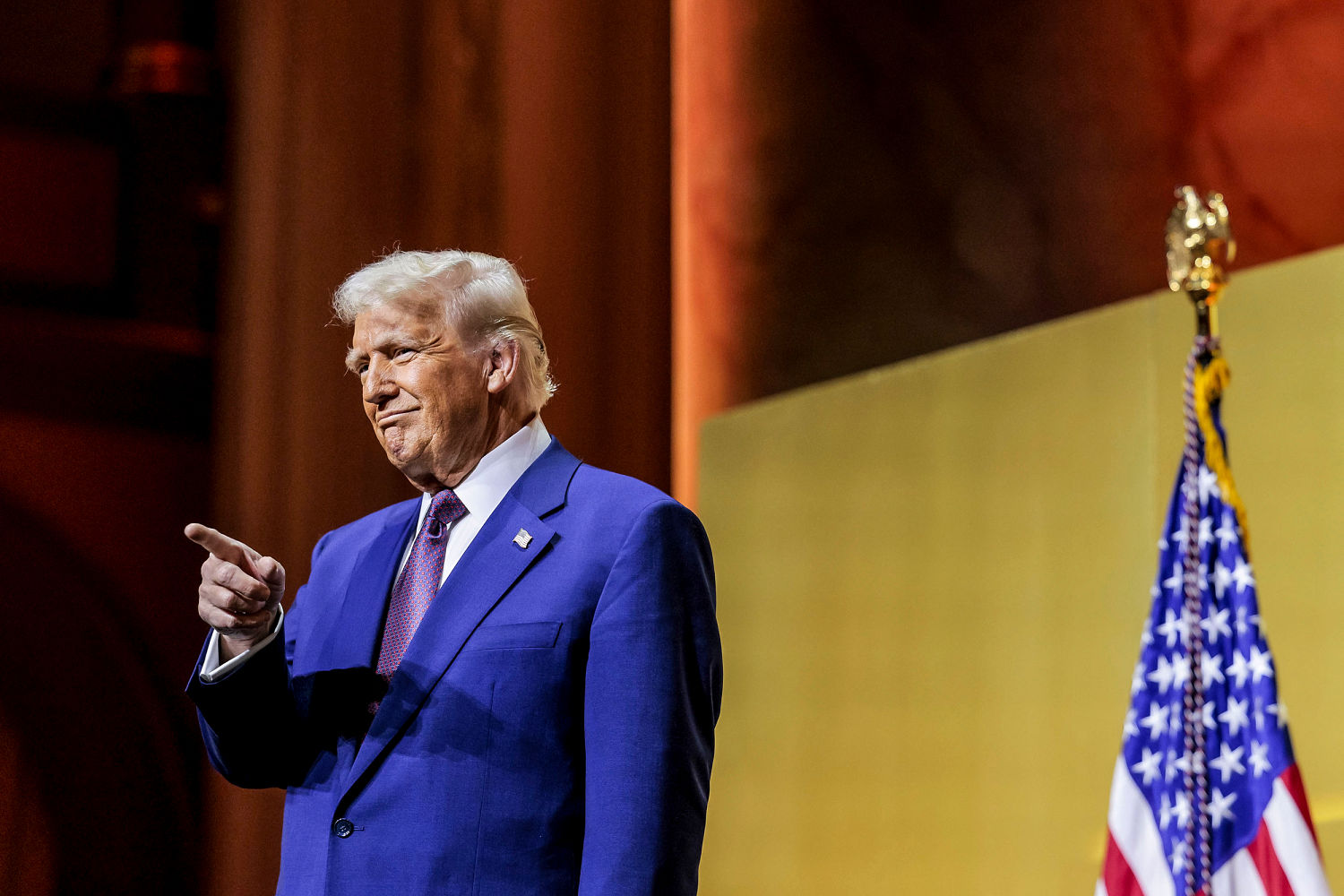JD Vance thinks AI will uplift Americans — It’s more likely to erase them

At the recent Paris AI Summit, JD Vance attempted to paint a hopeful picture of artificial intelligence. The vice president reassured Americans that AI isn’t meant to replace them. Instead, it promises to make them stronger, more productive, and, ultimately, happier.
It's a nice sentiment — if only he had any real say in the matter.
Despite his political clout, Vance is not the one steering this ship. The Big Tech overlords are, and their vision has little to do with human flourishing. In fact, one of those very people is Elon Musk — a close colleague of Vance’s — who is playing a direct role in accelerating AI’s dominion over human labor.
Last year, Musk warned that AI would take all our jobs. Now, with the Department of Government Efficiency, he is making that warning a reality. Earlier this month, the Washington Post reported that Musk’s DOGE began feeding sensitive government data into AI systems to analyze spending and identify cost-cutting measures. The outcome: increased job cuts, not increased efficiency. One government official tracking DOGE’s operations put it bluntly — DOGE’s true aim is to replace human workers with machines.
The broader picture here is grim.
Once upon a time, planned obsolescence referred to light bulbs burning out too soon and smartphones mysteriously slowing down after software updates. Now, the principle is being applied to humans. AI isn’t just replacing workers; it’s making them obsolete by design.
Big Tech’s brightest minds have all but admitted it. OpenAI CEO Sam Altman has been spearheading what I call the “Make Individuals Irrelevant” movement, positioning AI as the inevitable replacement for human labor. Altman’s backing of universal basic income initiatives, including the largest-ever U.S. study on the policy, underscores this dystopian vision.
NVIDIA’s CEO Jensen Huang claims AI won’t replace humans entirely — just in jobs where it’s "1,000 times better." A soothing assurance, except that AI is rapidly approaching being 1,000 times better at everything. Meanwhile, Meta is cutting thousands of jobs, targeting so-called “low performers” while funneling billions into AI development.
We are witnessing a systemic transition, one that reshapes society at its core.
The word Orwellian might come to mind, but it’s not quite right. Vonnegutian may lack the same ominous ring, but it’s far more accurate. We fixate on “1984” when we should be paying attention to “Player Piano.”
Kurt Vonnegut wasn’t just a magnificent writer — he was an oracle of sorts, predicting the dehumanizing effects of technological progress with uncanny accuracy. In “Harrison Bergeron” (1961), he imagined a world where enforced equality crushes individuality, eerily reflecting today’s obsession with ideological conformity. Even “Slaughterhouse-Five” (1969), with its nonlinear storytelling and fatalistic outlook, anticipated the fractured way we now consume information in the digital age.
The American author saw the AI revolution coming over 70 years ago. In “Player Piano,” published in 1952 — two years before Orwell’s “1984”— Vonnegut depicts a society fractured into two classes: an elite technocratic caste that designs and maintains the machines, and a vast underclass rendered obsolete by automation. These displaced workers aren’t brutally oppressed; they are simply unneeded, their skills devalued, their existence reduced to redundancy. Some rebel. Others sink into apathy, stripped of any meaningful role.
Vonnegut’s vision was eerily prescient. Whereas Orwell warned of a world ruled by fear and surveillance, Vonnegut foresaw something subtler but no less insidious — a future where machines erode the essence of human identity.
Vonnegut even hinted at the idea of universal basic income — not as a utopian fix, but as a sedative, a means of pacifying the newly idle masses.
In truth, universal basic income may be the only plausible solution as AI advances at an exponential rate. Moore’s Law, in simple terms, states that computing power doubles approximately every two years. This means that technological progress does not advance in a straight line but along an accelerating curve. What seemed like distant science fiction a decade ago — AI composing symphonies, diagnosing diseases or replacing human artists — is now a reality.
AI is surpassing us at a pace we cannot comprehend. A machine learning model today is exponentially more powerful than one built just a few years ago. The implications of this are staggering. What took humans centuries to master, AI can now do in months. Any job that involves pattern recognition, decision-making or creative output is under threat.
In the past, automation primarily targeted low-skilled labor — factory workers, cashiers and assembly line operators. The solution was always upskilling— learning new trades, moving into roles that required greater ingenuity, judgment and complex problem-solving. But how do you upskill when there’s nowhere left to go?
AI is coming for white-collar jobs — teachers, doctors, engineers — every profession that once seemed immune. It’s not just automating repetitive tasks; it’s automating everything.
But while AI can replace labor, it will never solve the deeper existential crisis it is creating. A society built on work is facing a future where work is no longer needed. And no one has an answer for what comes next.
A monthly check from the government may put food on the table, but it can never provide meaning. It doesn’t answer the fundamental question: Why get out of bed in the morning? People don’t just need money; they need purpose. And that’s the problem no one in Silicon Valley has an answer for. In truth, they likely don’t have an answer because it doesn’t matter to them. Their motives are profit-driven, often in direct opposition to the idea of human fulfillment.
When discussing purpose and meaning, it’s important to recognize that while the two are closely related, they aren’t identical. Purpose is outward-facing — the role one plays in society, the contribution one makes. Meaning is internal — the sense of fulfillment and significance derived from existence. AI threatens both.
JD Vance may believe in a future where AI uplifts humanity, but the trajectory suggests otherwise. We are being made obsolete, every single one of us. The machine doesn’t need us to be productive, strong or happy. It just needs us to be silent while it takes over. Unless we reclaim and redefine what it means to be human in the age of AI, we risk becoming nothing more than a species that has outlived its purpose — spectators in a world no longer made for us.
John Mac Ghlionn is a writer and researcher who explores culture, society and the impact of technology on daily life.
-

Mira Murati Launches Thinking Machines Lab to Make AI More Accessible
After leaving OpenAI last year, Mira Murati is finally ready to share what she's working on.Wired - 3d -

Who Will Republicans Want to Succeed Trump? JD Vance Gets Cheers From the Right
The Conservative Political Action Conference this week was abuzz with talk about President Trump’s Republican heir. And much of that centered on JD Vance.The New York Times - 16h -

‘Like a cruel auction’: what Ukrainians think of Trump’s peace talks with Putin
Ukrainians inside the country and abroad express their hopelessness, anger and defiance at negotiations between Washington and Moscow. Europe live – latest updates “I don’t think that this ...The Guardian - 21h -

Nvidia helps launch AI platform for teaching American Sign Language
Nvidia has unveiled a new AI platform for teaching people how to use American Sign Language to help bridge communication gaps. The Signs platform is creating a validated dataset for sign language ...VentureBeat - 1d -

Together AI’s $305M bet: Reasoning models like DeepSeek-R1 are increasing, not decreasing, GPU demand
The demands of DeepSeek's advanced reasoning capabilities are pushing enterprises toward Together AI's optimized infrastructure platform.VentureBeat - 1d -

This Chinese AI Bet Has Outperformed Magnificent Seven Names Like Meta and Google This Year
Alibaba stock soared after a strong earnings beat, bringing its year-to-date gains to 60 percent.Inc. - 23h -
Celsius wants to sell more energy drinks to women. Wall Street likes the move.
Celsius shares are up more than 30% after its quarterly results topped estimates and it announced plans to buy drink maker Alani Nu.MarketWatch - 15h -
Oil prices end lower, erasing weekly gains
“A number of decisions are pending … that could drive the oil price in one direction or the other,” one analyst noted.MarketWatch - 13h -
Review: In the uplifting yet mundane 'The Unbreakable Boy,' a dad finally wises up
Based on the memoir by Scott LeRette, the movie takes on subjects including autism and brittle-bone disease with a faith-based foundation in church and family.Los Angeles Times - 1d
More from The Hill
-

FBI told to transfer 1,500 personnel from headquarters: Reports
The FBI told managers that 1,500 personnel will be transferred from the headquarters near Washington headquarters to offices around the country, including around a third being placed in an Alabama ...The Hill - 6h -

Trump removes Brown, names new Joint Chiefs of Staff chairman
President Trump has fired Air Force Gen. CQ Brown Jr., a four-star pilot, and named Air Force Lt. Gen. Dan “Razin” Caine to be the country’s next chairman of the Joint Chiefs of Staff. “I want to ...The Hill - 7h -

Federal judge temporarily blocks Trump DEI executive orders
A federal judge has temporarily blocked parts of President Trump’s executive orders that sought to end the federal government’s backing of diversity, equity and inclusion (DEI) efforts. U.S. ...The Hill - 8h -

Federal judge extends decision blocking DOGE from Treasury payment system
A federal judge on Friday extended an earlier decision barring employees with the Department of Government Efficiency (DOGE) from accessing a sensitive federal payment system at the Treasury ...The Hill - 9h -

Donalds coy on potential Florida governor bid while thanking Trump for endorsement
Rep. Byron Donalds (R-Fla.) was coy while discussing his potential Florida gubernatorial bid during a Friday interview while also expressing gratitude for landing an early endorsement from ...The Hill - 9h
More in Politics
-
NYC Mayor Eric Adams' corruption case continues for now, judge rules
A judge in New York City Mayor Eric Adams' corruption case has appointed an outside attorney to argue over the Department of Justice's request to drop the federal charges.CBS News - 6h -

FBI told to transfer 1,500 personnel from headquarters: Reports
The FBI told managers that 1,500 personnel will be transferred from the headquarters near Washington headquarters to offices around the country, including around a third being placed in an Alabama ...The Hill - 6h -

Trump removes Brown, names new Joint Chiefs of Staff chairman
President Trump has fired Air Force Gen. CQ Brown Jr., a four-star pilot, and named Air Force Lt. Gen. Dan “Razin” Caine to be the country’s next chairman of the Joint Chiefs of Staff. “I want to ...The Hill - 7h -

Trump scores big legal wins, but efforts to reshape government still face court hurdles
The Trump administration's efforts to swiftly remake the federal government notched some big wins in court this week — including a ruling that allows its firing spree to continue — but a number of ...NBC News - 7h -

Trump fires chairman of Joint Chiefs of Staff CQ Brown
President Donald Trump fired Joint Chiefs of Staff Chairman CQ Brown Jr., the country's highest-ranking military officer, from his position. This comes amid a wave of administration changes under ...NBC News - 8h